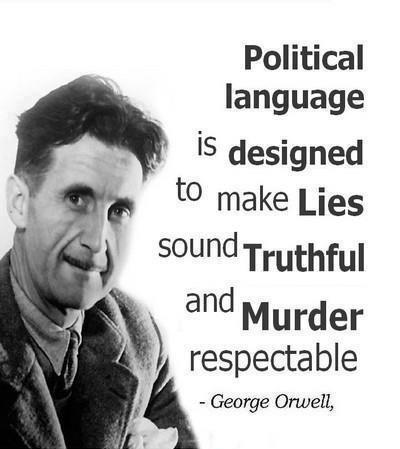Political language is designed to make lies sound truthful and murder respectable

Political language is designed to make lies sound truthful and murder respectable
George Orwell, a renowned writer and political commentator, was acutely aware of the power of language in shaping public perception and manipulating reality. In his essay "Politics and the English Language," Orwell famously wrote, "Political language is designed to make lies sound truthful and murder respectable, and to give an appearance of solidity to pure wind." This statement encapsulates Orwell's belief that politicians and those in power often use language as a tool to deceive and manipulate the masses.Orwell's own experiences as a journalist and propagandist during World War II informed his understanding of the ways in which language can be used to distort the truth and justify atrocities. In his novel "1984," Orwell introduced the concept of Newspeak, a language created by the totalitarian regime of Oceania to control thought and suppress dissent. Newspeak is characterized by its deliberate ambiguity and euphemistic language, which serves to obfuscate the true intentions of the ruling party and maintain their grip on power.
Orwell's critique of political language extends beyond the realm of totalitarian regimes to encompass all forms of political discourse. He believed that politicians and public figures often use language to manipulate public opinion and conceal their true motives. By employing euphemisms and vague language, politicians can sanitize their actions and make even the most heinous acts seem palatable to the public.
Orwell's warning about the dangers of political language is as relevant today as it was during his lifetime. In an era of "fake news" and misinformation, the manipulation of language has become even more pervasive and insidious. Politicians and media outlets routinely distort the truth and manipulate language to serve their own interests, often at the expense of the public good.












 Friendship Quotes
Friendship Quotes Love Quotes
Love Quotes Life Quotes
Life Quotes Funny Quotes
Funny Quotes Motivational Quotes
Motivational Quotes Inspirational Quotes
Inspirational Quotes